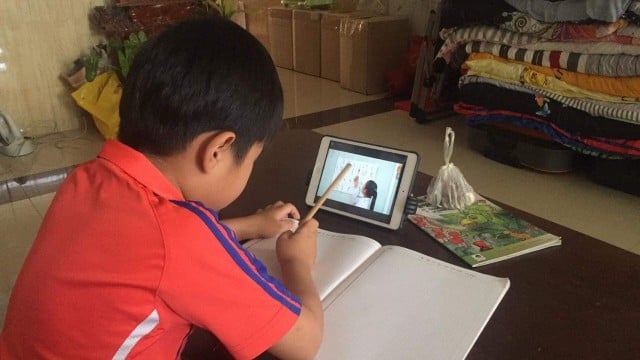Cambodian Students' Online Learning Challenges during the COVID-19 Pandemic

- By Cambodianess
- July 17, 2021 8:10 PM
The COVID-19 epidemic has altered the way people learn in all fields of study. Many countries' educational systems have been disrupted as a result of the spread of coronavirus. Face-to-face meetings that were once used for teaching and learning have now been replaced with virtual meetings in a variety of online learning apps.
All Cambodian schools have been instructed to construct online learning programs in order to provide pupils with more learning options and to help them improve their skills. Those are the most essential considerations we must make. Students at all grade levels face numerous challenges, including limited internet access, interruptions while learning at home, a lack of teaching, communication difficulties, the ability to afford a smartphone, the ability to use a smartphone, technology ignorance, a lack of parental understanding, and school dropouts.
The most crucial aspect of online learning is the internet. According to a recent study published on Cambodian Education Forum, restricted internet access is the most difficult challenge for all students in Cambodia, particularly in rural areas where internet access is scarce. Zoom App, Microsoft Team, Google Meet, Group Messenger, Facebook Group, and group Telegram have all been suggested for usage as online learning tools in Cambodia. The internet is required for these online platforms to function. However, as a result of the restriction, a slew of issues has developed, making it harder for pupils to study.
Furthermore, as reported in the study, several students stated that learning from home presents many challenges. They can hear a lot of noise from their surroundings while they learn at home, for example, they also stated that while they were studying at home, they were bothered by a large number of individuals who speak quite loudly. They were diverted from their internet activities as a result of this behavior. Moreover, they stated that individuals who were drinking and performing karaoke in the villages frequently disrupted their attention to the online lectures.
Another difficult issue is the lack of education. Many pupils expressed dissatisfaction with certain professors since they did not teach them the curriculum. Those pupils claimed that they had learnt nothing from their professors since the virus spread because their teachers had disregarded online instruction. Furthermore, the pupils claimed that some of their professors were unsuitable for teaching since they had no obligations with their jobs.
Moreover, several students stated that communication was a problem for them. As a result, students find it difficult to communicate and listen when learning online. They said that when they spoke, their teachers did not hear them, and the other way around. Furthermore, they claimed that the aforementioned factors interfered with their learning and will have harmful consequences in the future. Furthermore, they stated that if their future occupations were not satisfactory, the consequences would eventually be seen in their country's sluggish progress.
Another difficult issue is the cost of a smartphone and the ability to recharge it. Some pupils said they couldn't afford a smartphone since their parents were impoverished and they didn't have enough money to buy one themselves. They were unable to learn online as a result of this. Furthermore, other students stated that they possessed cellphones but lacked the funds to replenish their phone credit cards. As a result, they were unable to learn effectively. They were able to determine when their phone accounts were active, but they could not when they were not.
The design of operating a smartphone is another big issue. A few female students stated that their parents would not allow them to have a smartphone; therefore, they were unable to learn online due to their lack of access to one. They said that their parents were concerned that they might use their cellphones for purposes other than learning, such as talking for fun or wooing. Furthermore, their parents said that there were sexual photos on the internet that their girls might see. As a result, their online learning yielded no benefit.
Another important problem is technological illiteracy. The epidemic of COVID-19 was unprecedented, and many students were unprepared for online modalities. As a result, they were unable to deal with online learning. The students said that they had learnt nothing from online platforms because they did not know how to utilize them and that their futures were being thrown into disarray. Finally, those pupils expressed their dissatisfaction with their prospects.
Another group of students stated that their problem was a lack of parental understanding. They claimed that their parents were unaware of the importance of learning, particularly online learning. They went on to say that they couldn't study effectively since their parents didn't understand, and that they weren't extrinsically driven. Even though they were genuinely motivated, they appeared to slow down the online learning process. As a result, individuals appeared to learn less from online courses.
School dropout is a byproduct of learning rather than a difficulty. Some adult students have dropped out of school as a result of the numerous obstacles they have faced, and they have been seeking suitable employment to support their families. This is a bad omen for the country's future development. A country cannot grow if its human resources are insufficient. Dropout is something we all fear because, after an abrupt dropout, students may continue their lives in the wrong direction since they are not qualified to seek an acceptable career and may wind up associating with a poor role model in society. That would cause issues in society. In a nutshell, dropout is the outcome of the difficulties of online learning during the epidemic.
Everything taken into account, the COVID-19 epidemic has wreaked havoc on every sector of society, particularly online education institutions. Learners have faced several problems as a result of online learning. As a result, the Cambodian government must take immediate action to address these issues. Taking action only once is insufficient; continuous activity is required.
Sereyrath Em is a teacher of English at Kith Meng Brast High School, a visiting lecturer at Chea Sim University of Kamchaymea, a PhD candidate at the University of Cambodia and a Hungarian Government PhD Scholarship Awardee.
*The article was originally published on Cambodian Education Forum















